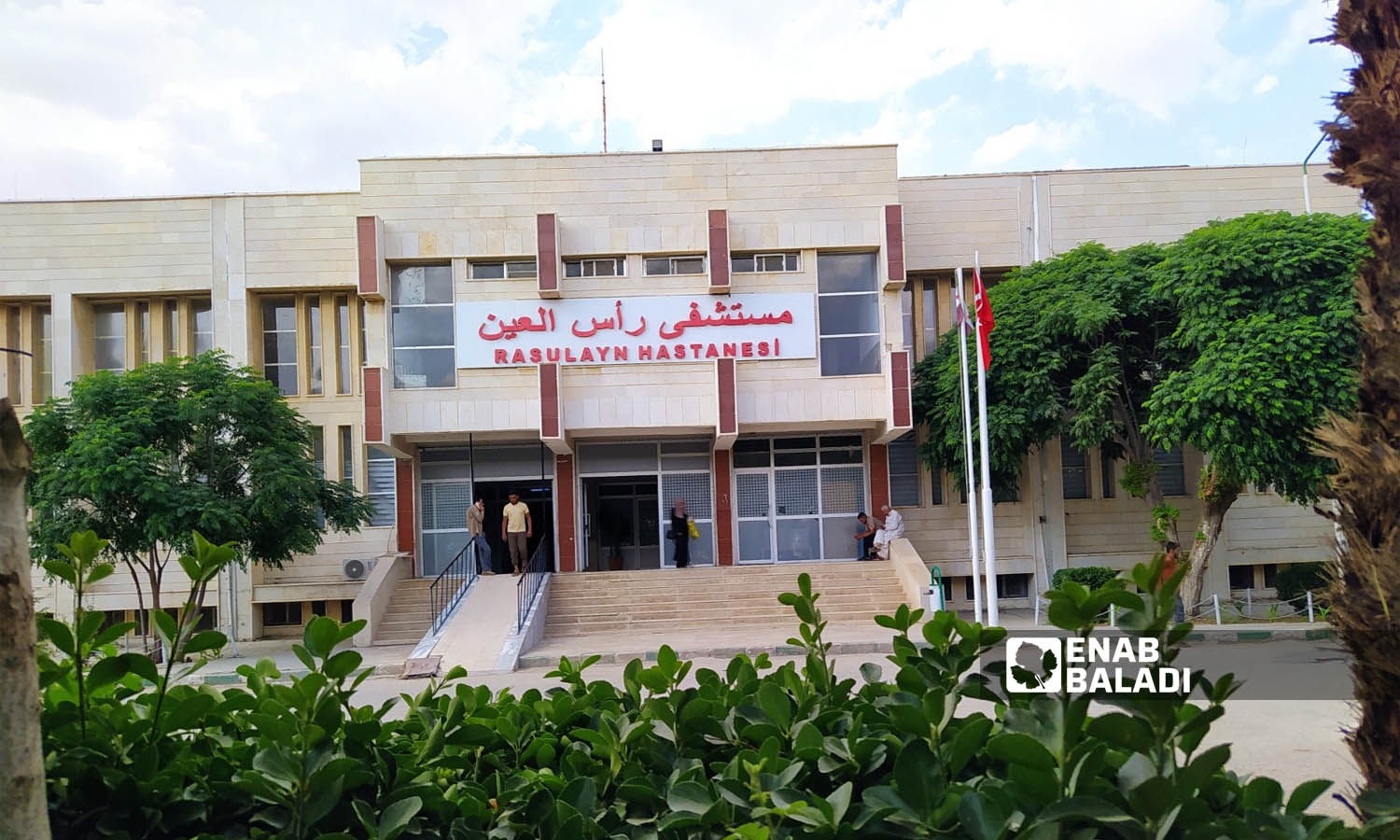



Enab Baladi – Ras al-Ain
Ras al-Ain National Hospital, which is considered the main healthcare facility for the local population, faces fundamental challenges related to the weakness of medical staff and the lack of some specializations.
It is under great pressure as it is the only public hospital in the region, and it is considered a destination for the majority of the population, as they depend on its vital services, according to what civilians from the city told Enab Baladi.
Hospital patients suffer from a shortage of specializations in surgery, obstetrics, children, cardiovascular, and internal diseases, as this shortage causes delays in the provision of critical medical services and may sometimes lead to a deterioration of patients’ condition or exacerbation of their health problems.
The lack of modern medical equipment is an obstacle for the hospital’s patients, in addition to the lack of qualified medical personnel in the National Hospital of Ras al-Ain, as many residents do not consider it capable of providing high-quality health services.
A few days ago, Noura al-Obeid needed a cesarean section due to a medical condition she had recently suffered, but the absence of a gynecology specialist in the hospital prompted her family to search for first-aid alternatives that were not within reach.
Al-Obeid told Enab Baladi that clinics with the same specialization exist in the city of Ras al-Ain, but that this type of operation may cost more than $200, which is not a small amount for many residents of the area.
She added that she comes from a family that is not well-off enough to perform the operation, which prompted her family to sell some of the sheep they owned to perform the operation.
Al-Obeid’s case reflects the challenges of the healthcare sector in Ras al-Ain, where low-income families have difficulty accessing essential health services that are not available in the National Hospital.
The high costs of treatment in private clinics make it more difficult for the population to receive the necessary health care.
The hospital reopened in 2019 after its restoration by the Turkish Ministry of Health, which has been fully supervising it since it took control of the area after a military operation it launched against the Syrian Democratic Forces (SDF).
The hospital used to provide services in women’s and children’s clinics with the beginning of its restoration, according to the Turkish َAnadolu Agency (AA).
However, these services have gradually decreased and are no longer available today, according to what Enab Baladi’s correspondent monitored in the area.
In his turn, Abdulaziz Khalaf suffers an amputation in his hand as a result of a previous injury from a landmine explosion he was exposed to in Ras al-Ain.
Khalaf told Enab Baladi that he visited the National Hospital in search of a prosthetic limb, but this type of equipment is not available there.
He added that the Ras al-Ain region mainly suffers from a lack of support with regard to prosthetics, as he did not obtain medical compensation for his lost limb, despite years of searching.
Rakan al-Jaloud, head of a health directorate in the city, told Enab Baladi that the main reason for the deterioration of health services in the region is the lack of medical staff and doctors, in addition to the poor financial support provided to them.
He added that the National Hospital in Ras al-Ain is witnessing a severe shortage of medical personnel, which negatively affects the quality of health care provided to patients.
Al-Jaloud pointed out that the city of Ras al-Ain also suffers from a shortage of cadres, nurses, and technicians, as most of the former doctors were from outside Ras al-Ain, due to the emigration of a large number of doctors from the city.
Compared to the areas in northern Aleppo, the city of Ras al-Ain faces an “acute” shortage of support, and the city is living in a state of “siege and isolation,” which impedes efforts to provide the necessary support for the medical sector, according to al-Jaloud.
The city of Ras al-Ain is located in the north of al-Hasakah governorate, along the Turkish border, and is controlled by the Turkish-backed Syrian National Army (SNA), while the SDF controls all adjacent areas, making its only outlet through the Turkish border.
The director of health in Ras al-Ain said that he is in contact with the Syrian Interim Government (the political umbrella of the National Army) and the Turkish authorities in Urfa province (which has guardianship over the region), to try to find solutions that might improve the health situation in the city.
Despite the challenges the region faces in terms of medical services, the city’s health directorates are working to overcome the difficulties and enhance health care for citizens, according to al-Jaloud.
Turkey is considered directly responsible for all hospitals in northern Syria, within the SNA-controlled areas, and the National Ras al-Ain Hospital is one of them.
The Turkish Red Crescent is responsible for managing the hospital and the salaries of its employees, and the director of the hospital is a Turkish doctor.
The hospital does not usually provide clarifications to the media, as an interview with its management requires applying to the center of the Turkish state of Urfa to obtain approval, and this mechanism often takes a few months to obtain a response.
if you think the article contain wrong information or you have additional details Send Correction